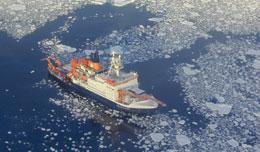Study casts doubt on iron-induced carbon sequestration.
The theory that adding iron to the oceans can help suck up atmospheric carbon dioxide cheaply and efficiently has received a further blow. A study1 published in this week's issue of Nature (see page 577) finds that the potential of iron-induced carbon sequestration is far lower than previously estimated.
During the CROZEX experiment in 2004 and 2005, scientists on board the British vessel RSS Discovery observed the impact of natural iron fertilization on algal growth and carbon export near the Crozet Islands, an archipelago some 2,000 kilometres southeast of South Africa. The team found that, relative to one unit of added iron, the amount of carbon sequestered to 200 metres' depth, where it will stay for a couple of decades, was almost 80 times smaller than the amount that scientists had determined during a similar study in the nearby Kerguelen region2.
"Ecosystem response and carbon export seem to vary very substantially from region to region," says Ulrich Bathmann, a biological oceanographer at the Alfred Wegener Institute (AWI) for Polar and Marine Research in Bremerhaven, Germany, who was not involved in the new study. "And the closer you look, the more complex the story gets."
Ocean fertilization: dead in the water?
Thu, 29 Jan 2009 17:51:38 GMT




No comments:
Post a Comment